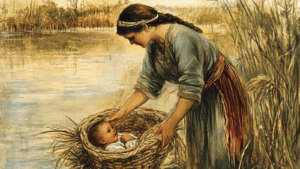Does SabbathSabbath is a weekly day of rest, the seventh day, observed on Saturday in Judaism and on Sunday in Christianity. In the book of Genesis, God rested on the seventh day; in the Gospel accounts Jesus and his disciples are criticized by some for not... More still matter? Many folks would say no.
Keeping the Sabbath seems kind of lightweight compared to killing, idolatry, adultery, and theft. Many think that keeping the Sabbath is mainly about going to church on Sunday (or synagogueA synagogue is a Jewish house of worship. Jesus often taught in synagogues where he sometimes ran afoul of Jewish leaders. In the book of Acts, Paul and others attend synagogues and teach in them. More on Friday or Saturday), and that such a practice ought not be considered crucial. But Sabbath is not just another activity. Sabbath is, in fact, lack of activity, centered in not doing. On the Sabbath, you don’t work; you cease the endless round of activity and leave room for the Spirit. Sabbath is rooted in graceGrace is the unmerited gift of God's love and acceptance. In Martin Luther's favorite expression from the Apostle Paul, we are saved by grace through faith, which means that God showers grace upon us even though we do not deserve it. More. You don’t work but neither does anyone else. Sabbath is marked by justice.
What if this commandment that we most abuse is, in fact, the very commandment that we, our congregations, and our communities are in most need of heeding? What if this commandment, if obeyed, turns out to be pure gift?
In Exodus 20:8-11 the commandment to keep the Sabbath is tied to God’s manner of creationCreation, in biblical terms, is the universe as we know or perceive it. Genesis says that in the beginning God created the heavens and the earth. In the book of Revelation (which speaks of end times) the author declares that God created all things and... More as described Genesis 1 where God established a divine pattern of six days of work and one day of rest, intended to be our pattern as well. Here is the rhythm to which we should be entrained. The alternative to this balanced pattern is either no work or constant work with no rest. Both options carry their dangers. On the one hand the gift of work bestows on individuals a certain dignity and place and is part of being made in the image of God to be stewards of creation. People need meaningful work. On the other hand, no rest means no time for refreshment. People need true rest — physically, psychologically, and spiritually. Most dangerously no rest leads us into thinking that we are indispensable to the workings of the world, that we are in fact not only created images of God but rather that we are God.
In the other version of the Sabbath commandment, Deuteronomy 5:12-15, we are commanded to observe the Sabbath not because of God’s pattern of creation but rather as a way of remembering that we were once slaves, yearning for both freedom and rest. When we hoard Sabbath only for ourselves and fail to insist on granting rest for all who labor — from our children to our fellow workers, from our beasts of burden to those alien residents who live and work among us — we are forgetting that the freedom God gave us in delivering us from bondage is intended as freedom for all. Sabbath reminds us that Sabbath practiced individually (I’m taking a Sabbath break today) without thought either for the well-being of the other or the deliverance of God, is no Sabbath at all. Hence Sabbath is a specified, set apart time, not any old time. And this reality itself turns out to be part of the gift: We do not stop in our own time, when the work is done; we stop in God’s time, in the midst of work. Very counter-cultural!
And the reasons for keeping the Sabbath do not stop there. Sabbath, a central idea throughout the Bible, is referred to 111 times in the Old Testament. Often keeping Sabbath is a mark of Israel’s identity. This was particularly important in the Exile. The enemy could destroy the templeThe Jerusalem temple, unlike the tabernacle, was a permanent structure, although (like the tabernacle) it was a place of worship and religious activity. On one occasion Jesus felt such activity was unacceptable and, as reported in all four Gospels, drove from the temple those engaged... More, the place of worship. But they couldn’t take away Sabbath, the time for worship, the time when we realize that all time belongs to God. Keeping the Sabbath marks us as God’s.
The word Sabbath also occurs 67 times in the New Testament. Most folks remember Jesus’ critique of the Sabbath in Mark 2:27, that it is made “for humans” probably because we are on guard for the super religious of all ages who would “enforce” Sabbath as more weapon than gift. Yet often we forget that JesusJesus is the Messiah whose life, death, and resurrection are God's saving act for humanity. More is called “Lord of the Sabbath” in all of the synoptic GospelsThe Synoptic Gospels are Matthew, Mark, and Luke. They are called Synoptics because they view the gospel story from a similar point of view; they also share large blocks of narrative material in common. More (MatthewA tax collector who became one of Jesus' 12 disciples. More, Mark and LukeThe "beloved physician" and companion of Paul. More).
Many of the Gospels stories tell us of Jesus healing on the day of Sabbath. In these stories, we watch as Jesus goes to the heart of what keeping the Sabbath means.
Jesus knew that the Sabbath was made to give life and healing and to reveal God’s mercyMercy is a term used to describe leniency or compassion. God's mercy is frequently referred to or invoked in both the Old and New Testaments. More. Saving life is not just lawful on the Sabbath, it is the very essence of the Sabbath.
Indeed, Jesus, as Lord of the Sabbath, carries in his very person the authority of Sabbath rest. “Come to me,” he says, “all you that are weary and are carrying heavy burdens, and I will give you rest. Take my yoke upon you, and learn from me; for I am gentle and humble in heart, and you will find rest for your souls. For my yoke is easy, and my burden is light.” (Matthew 11:28-30)
In the synoptic Gospels, Jesus himself keeps the Sabbath, interrupting his work with times of rest and prayer. In John, the Sabbath picture of Jesus is different. Jesus, like God, first works without ceasing. Then, at the end, Jesus speaks his final word from the cross, “It is finished.” Then he bowed his head and gave up his spirit.
This finality occurs on the day of preparation for the Sabbath. Here is Sabbath indeed. Jesus finally stops his work, and in this stopping Sabbath has been redefined. Now Sabbath not only points us to the end of God’s work in creation. Now all of time is marked by the ultimate cessation of activity. The cross finishes the work. Rest comes.
Here is a rest that looks for all the world like death, but, of course, it both is and is not. The week of PassionPassion is the theological term used to describe Jesus' suffering prior to and including his crucifixion. The Passion Narrative (the portions of the Gospels that tell of the Last Supper, trial, and crucifixion of Jesus) are often read in church during Holy Week. More is stretched into the first day of the new week where death is met by resurrection. Jesus now is not only Lord of the Sabbath, he re-centers Sabbath in his own death and resurrection.
Sabbath centered on the cross brings us full circle back to the Sabbath commandment in Deuteronomy. There we were told to observe the Sabbath in remembrance of God’s deliverance of us from slavery. Here in this final sealing of Sabbath rest we remember God’s ultimate act of salvationSalvation can mean saved from something (deliverance) or for something (redemption). Paul preached that salvation comes through the death of Christ on the cross which redeemed sinners from death and for a grace-filled life. More on the cross.
We keep the Sabbath that we might remember that the work indeed is finished. And we are called only to respond with thanksgiving, praise, and grateful practice of faith, including remembering the Sabbath day to keep it holyHoly is a term that originally meant set apart for the worship or service of God. While the term may refer to people, objects, time, or places, holiness in Judaism and Christianity primarily denotes the realm of the divine More.
Further Reading
- Dawn, Marva.Keeping the Sabbath Wholly: Ceasing, Resting, Embracing, Feasting. Grand Rapids: Eerdmans, 1989.
- Heschel, AbrahamGod promised that Abraham would become the father of a great nation, receive a land, and bring blessing to all nations. More JoshuaThe successor of Moses, Joshua led the Israelites into Canaan. More. The Sabbath: Its Meaning for Modern Man. Boston: Shambala, 2003 (1951).
- Jacobson, Rolf. “A Freedom That Is No Freedom: Jeremiah 34 and the Sabbatical Principle,” Word and World 22:4 (FallThe Fall refers specifically to the disobedience of Adam and Eve when they listened to Satan rather than adhering to God's command not to eat the fruit from the tree. When people act contrary to God's will, they are said to fall from from grace... More 2002) 396-405.
- Muller, Wayne. Sabbath: Finding Rest, Renewal, and Delight in Our Busy Lives. New York: Bantam, 1999.






